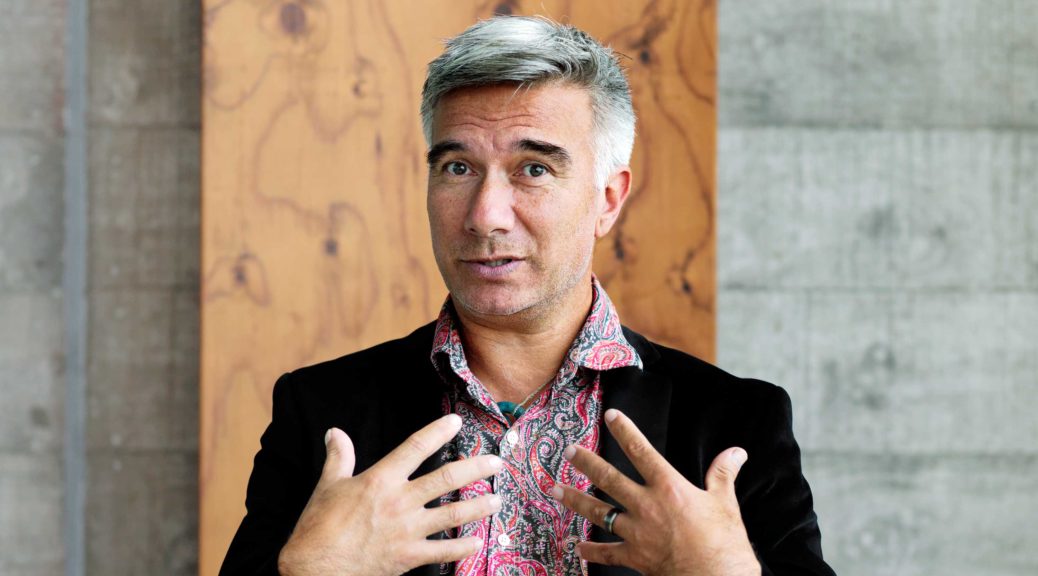WARREN MAXWELL
Ngāi Tūhoe
Te Rewa o Puanga School of Music and Creative Media Production
For Warren Maxwell from the College of Creative Arts, music has always meant connection. ‘I was lucky that I grew up in a musical family, and at an early age I felt the joy that music gave to people,’ he said. ‘I started playing the saxophone when I was 11 years old, and even at that age I could feel the ihi, the energy, of how good it felt to groove as a large ensemble.’
After completing his carpentry apprenticeship in Whāngārei, Maxwell moved to Wellington and studied jazz, forming band Trinity Roots and joining Fat Freddy’s Drop. ‘Wellington was really vibrant between 1995 and 2005. I felt there was creative licence; that it was okay to fuse different styles of music. It was supported by venues and by audiences alike.’
After a decade of national and international successes, the desire to continue to explore creatively led Maxwell back into academia. ‘I think a lot of artists get to that point where the more experimental you get with your art, the more challenging it is financially, which is what I love about the academic world,’ he said. ‘At Massey, you’re given that freedom to really push boundaries with your art and that’s what I’m immensely thankful for. I love being in the lecture theatres — that relationship between student and teacher, it’s reciprocal and I value that. I also feel very privileged to be able to research, because one of my concerns is how the industry of music seems to have taken over from the art of music.’
One of Maxwell’s current collaborative projects, Ka Pō Ka Waiata, is to connect with our blind community. ‘I’ve been very keen to try a concert in complete darkness, because there are so many visual distractions when you go to a concert. I love the idea that right from when you walk through the main auditorium entrance, it’s complete darkness,’ he said. ‘Sight is so influential. This show is about focusing in on all of our other senses. We arranged an interview with a blind kaumatua [elder] because we felt it was important for us understand how they might perceive music, and what can society do to acknowledge their community? One of the first things he said was just to listen.
‘In the concert, I’m playing a 200-kilogram very old tōtara log that I found down at Lake Wairarapa, and he is absolutely beautiful. We call him our koroua [grandfather] and he is a showstopper — he’s gorgeous to look at. I have no shame in personifying him, because to me he’s alive; there’s a spirit, a mauri, there. He’s semi- carved out like a waka [canoe]; I’ve attached strings to him, and I use contact mics which I can plug into an amplifier. The romantic in me loves the idea of hearing this koroua [male elder] speak again or sing again. Another thing I’m interested in is taking pre-industrial knowledge and combining it with new technologies, seeing how they intersect and the potential benefits that can come from that relationship.’
Another area of research that Maxwell has recently become involved with is experimenting with pahu, or Māori drums. ‘Traditionally, we have percussion, but we do not have the more widely used animal-skinned hand drums.’ he said. ‘A lot of other Pacific nations have hand drums, but when our ancestors came down to New Zealand, for some reason we did not bring that drumming culture with us. So I’ve started researching and making drums, using a traditional Hawaiian method, and I’m asking local hunters for skins. I found a recipe for how to cure deerskin in an old Aunt Daisy cookbook. I’ll go out to the beach or the bush, and find driftwood and I’ll cut a certain length. I’ll go through traditional appropriation methodologies; reciting karakia [acknowledgement] because that’s important for me as a Māori artist as well, to go through those processes that our ancestors went through.
‘A group of us have secured funding to run workshops in one of the local schools to take rangatahi [youth] out into the bush or to the lakes and make drums. It’s got to be relevant. We’ll use storytelling to encourage our young people to remember their ancestors who navigated across the Pacific Ocean and acknowledge their whakapapa [genealogy]. I feel like looking back is a solution to consumerism. There’s a proverb — ka mua, ka muri; walking backwards into the future — it’s like we’re moving forward but we’re always looking in our rear-view mirror and remembering the past, and I think that’s so important.’

